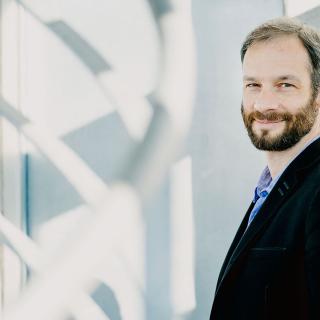Schubert’s tone language that was ahead of its time and melodies that search for their way, wander, continuously get lost yet still progress were the inspirations for Jörg Widmann. In this concert, the lied continues on from where Schubert’s unfinished symphony ends.
Sergei Rachmaninov’s music was deeply and firmly rooted in 19th-century Russia, as was his heart. The melodies of the composer's third symphony convey a deep sense of homesickness.
Dima Slobodeniouk
Born in Moscow but resident in Finland since 1992, Dima Slobodeniouk (b. 1975) is one of the most highly-acclaimed Finnish conductors in the world today. Beginning his career as a violinist, he turned to conducting in 1994. He has been Music Director of the Orquesta Sinfónica de Galicia since 2013, and has just ended a five-year term as Principal Conductor of the Lahti Symphony Orchestra. He has conducted top orchestras on both sides of the Atlantic, and since making his HPO debut in 2001 has been back almost annually.
“Schubert’s Unfinished is,” he says, “in practice the first Romantic symphony in the orchestral canon, and Rachmaninov’s third is already buffeting the borders of Romanticism. Widmann’s Lied pays homage to Schubert’s genius for composing music that ‘always sings’. There is a clear link here with the Unfinished Symphony. At the beginning of Lied, there is also a fine similarity with the opening of Rachmaninov’s third symphony. This builds a bridge that spans the whole programme, and it’s up to the audience to find it.”
Franz Schubert: Symphony. No 7 in B Minor, ‘Unfinished’
The movements of a symphony discovered in Graz in 1865 are even today still shrouded in mystery. Scholars have attributed them to Franz Schubert (1797–1828), as the manuscript is clearly in his hand, but why he wrote them and then abandoned them no one really knows. Why were they in Graz, and not found until nearly 40 years after his death? At least half of a third movement exists, but no finale. Though known to have been suffering from ill health in the 1820s, he still went on to compose his great C Major Symphony, so why did he not finish this one? Maybe the two existing movements are so perfect that they do not need a third or fourth. Or else these have simply been lost. The Entr’acte from the incidental Rosamunde music he was writing at around the same time is sometimes played as the finale to the ‘Unfinished’.
Even in its ‘unfinished’ state, the symphony is Schubert’s most famous work. It begins with an ominous, grumbling theme in the low strings that haunts the whole of the first movement. The second contrasts with the tragic first, but only for a moment. The unease is always there, seething beneath the surface.
Jörg Widmann: Lied
The distinctive music of German composer Jörg Widmann (b. 1973) almost always has a strong link with the past. His quotations from his great predecessors – Beethoven, Berg, Brahms, Haydn, Mozart, Mahler and Schumann – are not, however, used simply for effect at the expense of the whole; they are a natural part of the texture and treated with humble respect. The listener may also detect the influence of his teachers, Helmut Lachenmann and Wolfgang Rihm.
Widmann’s awareness of history is likewise present in his trilogy Lied–Chor–Messe (2000–2005) featuring various vocal genres but in purely instrumental works. Lied is part of a series commissioned by the Bamberg Symphony Orchestra and conductor Jonathan Nott coupling the Schubert symphonies with nine works by present-day composers. Widmann chose Schubert’s 600 songs. He also alluded to Schubert’s chamber music, even giving it a Mahlerian feel.
Sergei Rachmaninov: Symphony No. 3, Op. 44
Sergei Rachmaninov (1873–1943) well deserves to be called the most Russian of all Russian composers. The Revolution that caused him to seek refuge in the West was the greatest tragedy of his career. “Losing my country,” he said, “I also lost myself.” He earned a living for his family as a pianist, but in practice stopped composing almost altogether. He did, however, write his third symphony in a burst of creativity at the family’s holiday home in Switzerland in 1936. It was premiered that year in Philadelphia, but then virtually forgotten for decades. The critics said it was a mere shadow of the former Rachmaninov, though he himself thought it one of the successful things he had ever written. Naturally, people tended to compare it with his second symphony – though nearly 30 years had passed since that – and his great piano concertos. While the second symphony was still rooted in the Romantic era, the third was born in the early Modernist era from which Rachmaninov deliberately distanced himself. It is much more compact, more detached, even more American than the second, and the orchestration is much airier.

